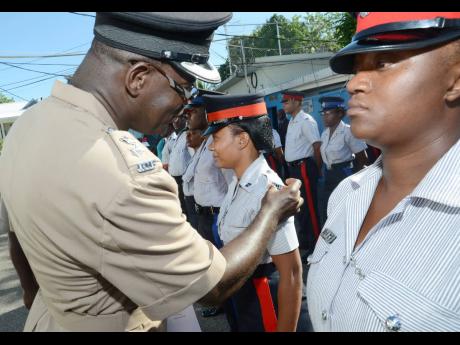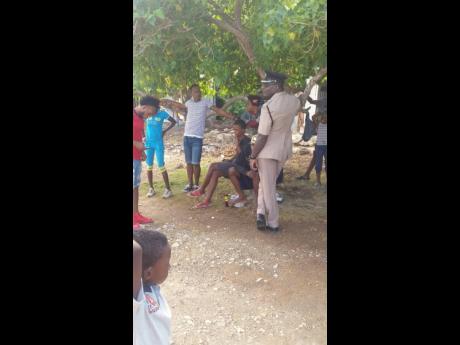‘My greatest honour’
DCP Bailey reflects on four decades of service to JCF, country ahead of retirement
On September 7, Deputy Police Commissioner Fitz Bailey will retire from the Jamaica Constabulary Force (JCF) after serving for 40 years and seven months. And although he would pursue his dream job as an accountant if given an opportunity to start...
On September 7, Deputy Police Commissioner Fitz Bailey will retire from the Jamaica Constabulary Force (JCF) after serving for 40 years and seven months. And although he would pursue his dream job as an accountant if given an opportunity to start over, he regards it as a privilege to have served the police force and his country.
As he sat with The Sunday Gleaner last Friday, there was bloodshed in the headlines yet again as five men were killed in Hanover. He firmly asserted that in the main, the police are aware of the identities of the criminals, but lack the evidence necessary to make arrests and secure convictions.
Hailing from rural St Catherine, he has witnessed the erosion of the values and principles with which he and his 10 siblings were raised. While acknowledging improvements in some aspects of society, he laments that others have worsened, including the high level of violence and a murder rate of 48 per 100,000, ranking Jamaica among the worst globally.
“I grew up with the rural concept of how children were raised with values, in terms of community involvement and a community raising children. I am from the old school and remember that if you did something at school and your parents heard, you had to be prepared for the strict discipline in the form of corporal punishment that would be applied,” said the senior cop.
Growing up at a time when communities – especially men – protected women and children, he rued the fact that Jamaicans have adopted an alien value system, where many individuals have become barbaric, selfish, uncaring, opportunistic, and lazy.
He refused to accept any suggestion that crime is driven by poverty, pointing to the many great successes of individuals who were dirt poor.
“The value of honesty was one of the things that was imparted. My parents were not wealthy, but what I got from them in terms of standards and principles, and how to conduct myself as an adult, money could not buy: respect for other people, respect for self, the elderly. To this very day, I would refer to somebody who is older than me as 'Sir'. No money can replace the value system instilled in us as children,” he told The Sunday Gleaner, insisting that some things such as integrity should never be for sale.
Today's level of vulgarity
In his youth, today's level of vulgarity was unheard of. Back then, neighbours were truly neighbourly and well-known within the community. In contrast, today's neighbourhoods are filled with strangers. He attributes this shift to the social media-driven globalised world, which distances people from their neighbours. And he blames the decline in societal values on the absence of civics education in schools and a lack of civic pride.
“So when I hear people talking about poverty leading to crime, I am not one of those, because we came from that environment. I know what it is to go to school not wearing shoes; when rain fell, you had to stuff the books inside your shirt to shelter them from being wet, but I live a value system that [says] 'what is not yours is not yours'. We couldn't go home with anything that was not ours. Mama going to ask, 'How you come by it?', and you don't let Papa come home and get involved. For as they say, when he talks, no man barks,” Bailey recounted.
His upbringing has helped him to maintain a strong bond with his siblings. Three of the eight boys are deceased.
... SHIFTING
SANDS OF TIME
Veteran cop Fitz Bailey has also witnessed changes in the police force since he joined in 1984.
“You can see the transitions; the changes from one stage to another,” said Bailey, who has served under the leadership of 11 police commissioners – a job he unsuccessfully applied for three times.
Bailey was recruited from Prospect College, an all-boys institution in St Mary where students were educated free of cost and were exposed to horseback riding. They had their own private beach and a 1,000-plus-acre property to explore and enjoy. Every student then played a musical instrument and sat the British General Certificate in Education exams at the ordinary and advanced levels. Being part of the Cadet Corps nurtured his appreciation for uniformed groups, so despite initially aspiring to become a chartered accountant, the idea of becoming a police officer didn't seem entirely unfamiliar to him.
“I told myself I wanted to be not just an ordinary accountant but someone of influence, but I had an experience where I saw a young man and he was properly flogged by a police officer. It was unnecessary and he was helpless. As a child, I thought that there was some level of injustice, and I think that drove me to the police force, and especially from my background as a cadet,” he told The Sunday Gleaner, saying he wanted to help fight injustice.
His initial assignments in the JCF were beat and foot patrols in the Corporate Area – from downtown Kingston and plazas in Half-Way Tree, to malls along Red Hills Road and up to Meadowbrook – albeit briefly.
Considered a model policeman, he was soon called to mentor younger cops selected for that patrol.
After two stints, Bailey was transferred to Mobile Reserve. He considers this time among his best years in the JCF.
“Those three years that I spent at Mobile Reserve played a critical role in who I am today. Now we have Specialised Ops, but it is my view that the police officers that leave the training facilities should get the experience of doing those types of operational policing. It is critical for your survival within the JCF. I did a lot of operational-type courses as well tactical-type training in a very hostile environment, where criminals will want to shoot you. That helps you to be more agile and alert as a policeman,” he said.
Still a constable, he then went to the Fraud Squad, where he spent 19 years. It was there that he began climbing the ranks, leaving as a superintendent and after heading the branch. It was there, Bailey said, he honed his investigative skills.
Although the operational capabilities of the JCF have been transformed and it has become more professional over the years, Bailey believes there is still more work to be done. Training and socialisation have helped in the process of developing a core professional force, and a number of their stations, processes and services are ISO:9001 certified.
“In 1984, when I became a police officer, the force was limping on in terms of resources. But when you look at the modernisation that has taken place over the years, I have worked with 11 commissioners and each having their own perspective. I have seen a significant transition and transformation,” he said, adding that the first real transition began with Francis Forbes.
He also mentioned the work of Colonel Trevor MacMillan, and credited Owen Ellington as one of the brightest persons to have held the top job. Some of the operational tactics today were from the Ellington era.
Major General Antony Anderson spearheaded the scientific transformation, but Bailey made it clear that the “transformation of the force did not start with Major General Anderson”. Most commissioners, he said, including retired DCP Novelette Grant, were responsible for elements of the transformation which has taken place.
... FURTHER MOVEMENT
When Bailey left the Fraud Squad, he went to the Organised Crime Investigating Division (OCID). He recalled the division was under fire after reports that some people went missing in Duhaney Park in a motor vehicle case. They were never found, and the branch was being linked to their disappearance. Scotland Yard was called in to lead the investigations as the branch's reputation took a beating.
He admitted to The Sunday Gleaner that when he was called to take over the operations, he did not want to go. However, he was given the free hand to do what he wanted, including recommend its disbanding. He was then answering to former DCP Mark Shields, who had the crime portfolio.
Bailey recalled putting 90 per cent of the staff through one-on-one interviews, following which he requested the transfers of about four persons he did not believe were fit to be at the location. He drafted an action plan for OCID and instituted a programme of integrity testing via polygraph for the entire team, including himself.
Others were eliminated and the process of rebranding began. His dream was to make OCID akin to the United States Federal Bureau of Investigations.
“OCID became one of the most envied divisions of the JCF. If all the police could work at OCID, we could get them, because that's where they wanted to be. The United States and our other foreign partners started to work with us. We got support in the form of physical reconfiguration of the building, and we established the Cybercrimes Unit. Communication and human trafficking units were also established,” he recalled.
A fire baptism
But he would move from OCID in 2012 to his first geographic division assignment – to head the St Andrew Central Police Division, which is headquartered in Half-Way Tree.
He would get a fire baptism on Valentine's Day in 2013, when he received a call from then Assistant Commissioner George Quallo with news that eight persons were shot in Nannyville, including an infant. His fish dinner was now past tense as he headed to the scene. Arriving at 9 p.m., he would leave some time after 3 a.m. with a vow that such an incident would never happen again.
A curfew with support from the Jamaica Defence Force took effect and with heavy policing, social intervention, and several working committees backed by the police, a structure was created. After three and half years, plans and policing strategies helped to reduce murders in the division from 79 to 37 in 2014, with little resources.
As the years rolled by, improved policing and legislative backing via the anti-gang legislation have been responsible for the conviction and incarceration of several of the country's most dangerous gang leaders, he added.
Throughout the decades in the JCF, he has seen much and he has made it a duty to value the persons with whom he worked over the years. He recalled using his own car to take a coworker to refill his cooking gas to ensure his work was not impacted by his personal problem; the heartfelt thanks from a junior rank who was about to be late but got his assistance to be on time; and the thousands of calls throughout the years just to say thanks.
He has no fears for the future of the JCF, noting that things are looking bright as the quality of the recruits and the specialised training continue to improve.
Bailey is leaving with no regrets, and he challenges the men and women of the force to continue to raise the standard and become the best that they can be.
“It's been my greatest honour to serve my country through the JCF,” he said.




